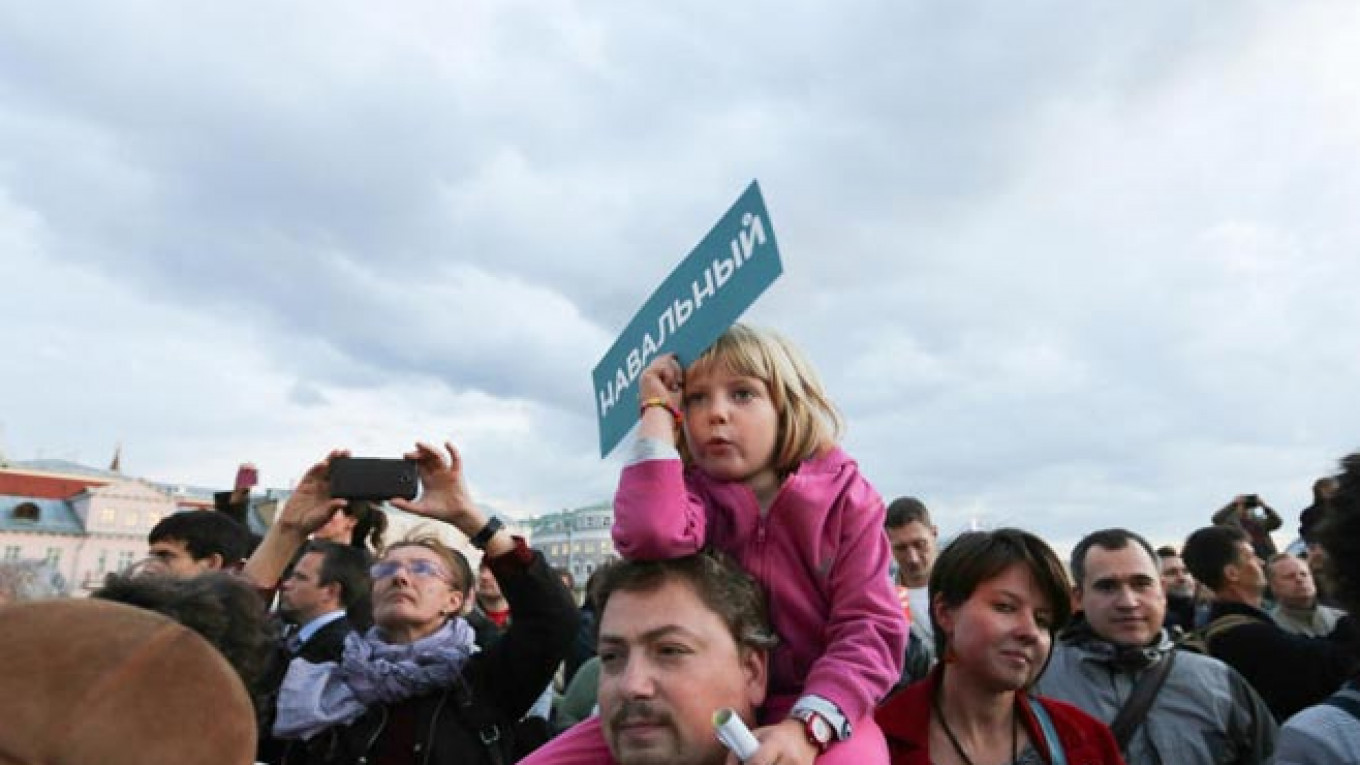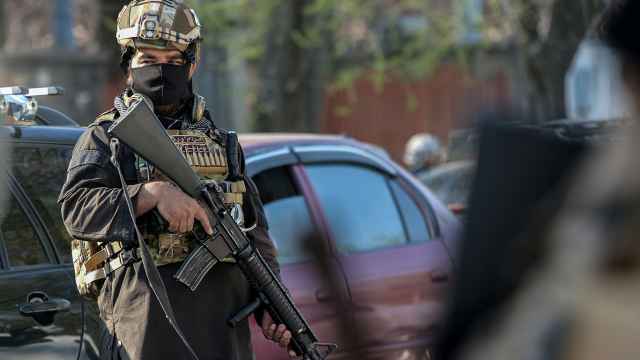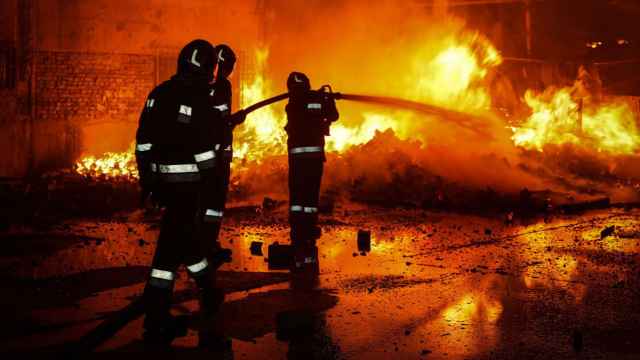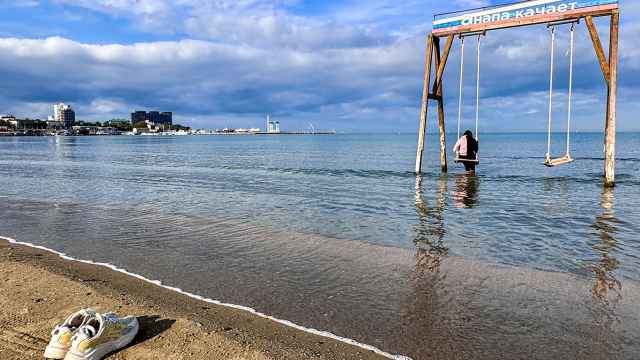United Russia deputy Alexander Sidyakin late Monday submitted to the State Duma a bill introducing prison terms for repeat violations of a law on public rallies, stirring fears among analysts of a crackdown on the opposition.
The move coincided with an effort by prosecutors to block all blogs being written in the interests of opposition leader Alexei Navalny, as well as re-posts of information on those blogs.
Analysts have attributed the moves to authorities hoping to prevent large-scale protests amid an economic slowdown in the wake of the uprising in Ukraine. The bill on public rallies and the attempt to block Navalny's blogs came shortly after several opposition-friendly news sites were blocked and legislation seeking to abolish popular mayoral elections in large cities introduced.
Ilya Konstantinov, a political analyst and nationalist activist, told Kommersant on Tuesday that he believed Sidyakin's bill would effectively suspend the constitutional right to freedom of assembly and introduce a "de facto state of emergency." The previous law drastically tightening penalties for violations at rallies, passed in June 2012, was also denounced by the opposition as unconstitutional.
In accordance with the amendments to the Criminal Code sponsored by Sidyakin, a protester who has violated the law on rallies and demonstrations more than once within a 180-day period would be sentenced to a fine of between 600,000 ($16,854) and 1 million rubles, community service of up to 480 hours or a prison term of up to five years.
Under the Administrative Code, individuals who have broken the law on rallies more than once would be fined up to 300,000 rubles, officials would be subject to a fine of up to 600,000 rubles and legal entities would face a fine of up to 1 million rubles. Protesters participating in unauthorized rallies near presidential residences would be fined up to 300,000 rubles.
In accordance with the current law, penalties are much milder, with individuals violating the law on rallies usually facing a fine of up to 20,000 rubles. A fine of up to 300,000 rubles is only applied if a protest leads to "damage to human health or property."
Sidyakin's bill seeks to make the penalty for disobeying a police officer detention for up to 30 days or a fine of up to 5,000 rubles for individuals, up to 20,000 rubles for officials and up to 100,000 rubles for legal entities. Currently, this violation is punishable by a fine of up to 1,000 rubles or detention for up to 15 days.
The authors of Navalny's blog on Tuesday called the bill an outrage and said that cases against protesters were routinely fabricated by police and courts. The new legislation would give the authorities more leeway to crack down on dissent, they said.
Analysts said the fear of a scenario similar to the recent Ukrainian revolution, also known as Euromaidan, was a primary cause for the bill.
Sidyakin himself called the legislation "an anti-Maidan bill" on Twitter and said that he did not "want the streets of Russian cities to turn into Hrushevsky Street," referring to the site of violent clashes between protesters and police in Kiev in January.
The bill would also have a special provision requiring organizers to make sure that "dangerous substances" are not carried by protesters, Vedomosti reported, citing sources close to the State Duma. The list of dangerous substances included tires, which were frequently used by demonstrators in Kiev in January and February in a sort of mass bonfire.
Dmitry Oreshkin, head of the Merkator research group, said that apart from the fallout of the Ukrainian uprising, the Kremlin was afraid of potential protests linked to the upcoming anniversary of high-profile clashes that took place on May 6, 2012, between police and demonstrators. Oreshkin said there may also be upcoming protests over what demonstrators see as President Vladimir Putin's failure to keep his election promises from May 2012.
Some observers noted that, far from preventing protests, the new penalties would actually trigger a backlash from the opposition.
"We will not hurt your eyes with stupid posters, letters and cries for attention anymore," Yevgeny Levkovich, a journalist and opposition activist, wrote on Facebook late Monday. "We will come out in such a way that Kiev's Maidan will look like a children's party. And you will be the only ones to blame."
The bill might prevent some people from attending rallies, but others may be prompted to take more radical action, like throwing bottles with flammable liquid, Oreshkin said.
He said that a revolution similar to the Ukrainian one was unlikely in Russia, however, and that the political model was more likely to evolve toward that of Belarus, Uzbekistan and North Korea.
The Kremlin believes that the Ukrainian uprising resulted from ousted President Viktor Yanukovych's weakness, he added, saying they would use the toughest possible methods to crush the opposition.
"They will just fire machine guns at the first rows of protesters," Oreshkin said.
Adding to the opposition's discontent on Tuesday, a major leader of the protest movement, Navalny, was targeted by prosecutors.
The Moscow Prosecutor's Office sent a letter to Internet service providers warning them that blogs on LiveJournal, Twitter, Facebook and Vkontakte being written "in the interests of Navalny," and re-posts of messages on those blogs by other people were in violation of the law, according to a copy of the letter posted on Navalny's Facebook page Tuesday. A representative of the office confirmed to Vedomosti that the letter had been sent.
Prosecutors explained the move by saying the publication of such information violated the conditions of Navalny's house arrest, according to which he is not allowed to use the Internet. They also said the blog posts contained calls for unauthorized rallies.
The opposition leader, who has been on house arrest since late February due to a criminal case into alleged fraud, has argued that he did not violate the rules because he had been writing messages on paper that were subsequently posted online by employees of his Anti-Corruption Fund and his wife.
The ban on Navalny's LiveJournal blog has been bypassed by many users who have created mirrors of the site and used the Tor browser, which helps provide access to blocked sites.
"The Moscow Prosecutor's Office employs not only slavish idiots and sycophants who do not hesitate to send letters that completely contradict the law but also idiots who do not understand the way the Internet works and what the Streisand effect is," the authors of Navalny's LiveJournal blog wrote, referring to the tendency of bans on information to popularize that information.
Contact the author at o.sukhov@imedia.ru
A Message from The Moscow Times:
Dear readers,
We are facing unprecedented challenges. Russia's Prosecutor General's Office has designated The Moscow Times as an "undesirable" organization, criminalizing our work and putting our staff at risk of prosecution. This follows our earlier unjust labeling as a "foreign agent."
These actions are direct attempts to silence independent journalism in Russia. The authorities claim our work "discredits the decisions of the Russian leadership." We see things differently: we strive to provide accurate, unbiased reporting on Russia.
We, the journalists of The Moscow Times, refuse to be silenced. But to continue our work, we need your help.
Your support, no matter how small, makes a world of difference. If you can, please support us monthly starting from just $2. It's quick to set up, and every contribution makes a significant impact.
By supporting The Moscow Times, you're defending open, independent journalism in the face of repression. Thank you for standing with us.
Remind me later.






